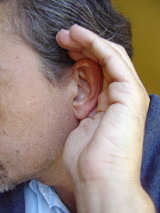Harvard Health Blog
Hearing loss may be linked to mental decline

Loss of hearing represents more than just difficulty hearing sounds. It can lead to social isolation and depression. A new study suggests that hearing loss may also be linked to loss of memory and thinking skills.
In a study published online yesterday in JAMA Internal Medicine, Johns Hopkins researchers found that declines in thinking skills happened faster during a six-year period among people with hearing loss than among those without it. Among the nearly 2,000 volunteers, all over age 70, those with hearing loss we also likely to develop “cognitive impairment,” defined as a substantial reduction in the score on a key test called the Modified Mini-Mental State Examination. The researchers estimated that it would take a hearing-impaired older adult just under eight years, on average, to develop cognitive impairment compared with 11 years for those with normal hearing.
This isn’t the first time that researchers have explored possible connections between hearing loss and brain function. Some saw what the Hopkins team saw, while others found no connection between hearing loss and thinking skills. The strengths of this study compared to earlier ones are:
• It included older people who had normal tests for memory and thinking at the start.
• All volunteers had standardized hearing tests performed by professionals.
• The same methods for testing hearing and brain function were used throughout the study.
Keep in mind that this new study shows an association. It does not prove that hearing loss causes a decline in thinking skills. The work also raises a huge question: can treating hearing loss prevent or slow an age-related decline in brain function?
What’s the connection?
If hearing and thinking skills are truly connected, there are several plausible reasons that might be so.
Hearing loss can lead to greater social isolation, something to which older people are already prone, and social isolation is a definite risk factor for cognitive impairment and dementia. Like impaired vision, diminished hearing can lead to less brain stimulation, another risk factor for a decline in thinking skills. It’s also possible that by making the brain work overtime to process the signals it is getting from the ears, hearing loss pulls away energy from the “thinking” parts of the brain.
Check your hearing
Up to two-thirds of adults older than 70 have some hearing loss. Doctors don’t routinely check for this problem, so it may be up to you to identify it. Since it often comes on slowly, you may be unaware you are having a problem.
Answering “yes” to three or more of the questions below, from the National Institute on Deafness and Other Communication Disorders, suggests that it’s a good idea to talk with your doctor. He or she may refer you for a formal hearing test.
- Do you have a problem hearing over the telephone?
- Do you have trouble following the conversation when two or more people are talking at the same time?
- Do people complain that you turn the volume of the radio or television up too high?
- Do you have to strain to understand conversation?
- Do you have trouble hearing in a noisy background?
- Do you find yourself asking people to repeat themselves?
- Do many people you talk to seem to mumble or not speak clearly?
- Do you misunderstand what others are saying and respond inappropriately?
- Do you have trouble understanding the speech of women and children?
- Do people get annoyed because you misunderstand what they say?
About the Author

Howard E. LeWine, MD, Chief Medical Editor, Harvard Health Publishing; Editorial Advisory Board Member, Harvard Health Publishing
Disclaimer:
As a service to our readers, Harvard Health Publishing provides access to our library of archived content. Please note the date of last review or update on all articles.
No content on this site, regardless of date, should ever be used as a substitute for direct medical advice from your doctor or other qualified clinician.















